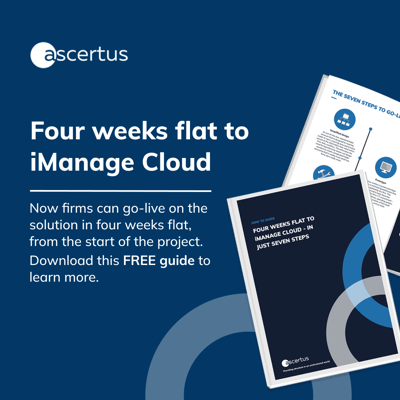
The business case for adopting the cloud is already well-made in the legal sector. Yet many of the smaller firms – with great potential to grow – are still displaying some reluctance to make the shift from an on-premises environment to the cloud. Typically, the over-riding sentiment tends to be ““if it ain’t broke, don’t fix it”.
What are the cloud computing advantages?
It is understandable – presently your technology works. Moving an environment requires investment of time and effort, and you may not have the technical capability in-house. Furthermore, instituting a new way of working requires a change in mindset, and you may feel that buy-in from employees is lacking.
However, the reality is that, the days of on-premises system are numbered. Secondly, the challenge of moving to the cloud may seem to be larger than it actually is. There are proven and reliable processes that make the transition from on-premises to the cloud environment efficient and quick. For instance, all through Covid, we at Ascertus helped many firms transition to cloud. In fact, today, we are able to help growing law firms to move their document management system (DMS) to the cloud in just four weeks, fully supported with best practice change management, so that there is minimal or no business disruption.
Cloud, as the foundation of business operation, is already the norm. If your firm isn’t in the cloud, you can’t do the following:
1. Cloud scalability allows your business to grow
From an IT standpoint, when we talk about scalability, we are really talking about the ability to increase or decrease resources – i.e., computing power, network capacity, storge – easily, quickly and without large costs. This kind of capability is essential where reliability, flexibility and agility is the name of the game when it comes to responding to market changes, customer demands or competitive situations.
If your firm isn’t in the cloud, this scalability isn’t within your organisation’s grasp. Scaling resources in an on-premises environment is expensive and disruptive to business operation. It may even require you to make additional, costly hardware and infrastructural costs. This in turn means that it will require time, and technical capability, especially given the complexities of areas such as cybersecurity, data protection and governance, and risk and compliance.
2. Cloud connectivity ensures your systems have the latest features
All software vendors are developing business applications adopting a cloud-first and mobile-first approach. This enables the technology vendor to continually enhance the features and functionality of their application and make them available to users as they are developed. The result and perhaps one of the biggest benefits of this “continuous development” approach is that users always have the latest and greatest functionality. Updates in on-premises systems are not only costly, but incredibly complex – and it wouldn’t be a stretch to say that given the pace at which technology is developing, practically impossible. The days of three-year technology upgrade cycles are long gone. Think Microsoft 365!
 3. You can’t take advantage of collaboration.
3. You can’t take advantage of collaboration.
In a blended/hybrid working environment, the ability to seamlessly collaborate – both internally within the firm and externally with clients and third-parties – is a business critical requirement. On-premises systems make it difficult. Take Teams for instance. In a primarily Microsoft-based legal industry environment, Teams has become the default tool for collaboration. It is built for the cloud and not available on-premises.
On the other hand, if you are in the cloud, Teams can be integrated with a wide variety of other Microsoft and third-party apps – allowing your lawyers to work the way they want to work. For example, if your firm’s DMS is integrated with Teams, your lawyers could link files residing in the DMS within chats. Or lawyers could search for, find, preview and even edit files directly from within Teams – without the need to switch between the two applications. In a dispersed working environment, it’s not difficult to see how easy collaboration and decision-making could become, right?
Likewise, in a cloud environment, there are many other tools, such as Power Automate, that allow you to create your own automated and streamlined processes without the need for coding or advanced software development capability in-house.
4. A broad range of cloud applications ensure you have the best tools on the market
A great benefit of the cloud for smaller and growing firms is that they can actually afford the same best-of-breed solutions that the largest legal practices in the industry deploy. Having the same technology as your mightiest counterparts will at the very least level the playing field for you, but importantly could even give your firm an edge because growing firms can be quicker off the ground and in decision-making, to provide a high level of personalised customer service.
Additionally, with a cloud infrastructure, your firm will be poised to adopt other emerging technologies too, be that AI or any other. At the way technology is advancing, it won’t be long before we start deploying technology in the enterprise like we install apps on our mobile devices.
In summary, the days of every law firm installing and maintaining their own IT infrastructure are long gone. Technology applications in the cloud means that rather than investing in deploying, maintaining and updating IT on-premises, the same investment can be redirected to grow the business – create new services, enhance client experience, expand into new practice areas and markets, and so forth. Without cloud, your firm isn’t future-proofed.
Other cloud based articles include:
- Cloud computing - you made it, but there’s more!
- Cloud Security - pay attention to your data
- Cloud storage cost
- Cloud migration - Are You Ready iManage Work (DMS) To The Cloud?
- Multi cloud denotes freedom of choice, how should you devise your firm’s cloud strategy?
- Migration to the cloud in 7 steps
- Case Study - Thirsk Winton Migrate From Private Cloud to iManage cloud
Join our monthly In The Know newsletter to stay up to date with the latest news and blogs posts
Have an iManage cloud question? Contact us...
.png?width=180&height=65&name=Ascertus%20Logo_360x130%20(1).png)